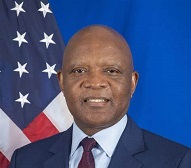By Woubishet Sisay Gessesse – The United States Government will continue to be committed to working with countries to bringing HIV/AIDS to an end as a public health threat, said a top U.S. offcial.
“PEPFAR is very committed to working with countries to bringing HIV/AIDS to an end as a public health threat…We show the impact of saving 25 million lives, preventing more than 5.5 million children – born free of HIV/AIDS, that this work cannot be stopped at this point. So PEPFAR is committed to working with countries to finish this fight, and make sure that we celebrate the end of HIV/AIDS as a public health threat by the year 2030,” said Ambassador Dr. John Nkengasong, the U.S. Global AIDS Coordinator and Senior Bureau Official for Health Security and Diplomacy at the Department of State.
It was on May 27, 2003 that the United States Leadership Against Global HIV/AIDS, Tuberculosis, and Malaria Act of 2003 (Public Law 108–25) was signed into law creating the President’s Emergency Plan for AIDS Relief (PEPFAR). PEPFAR is the largest commitment ever made by any nation for an international health initiative dedicated to a single disease.
“Together, we can get through the last mile in this fight, continue to save lives, and ensure that we never return to the early days of the HIV/AIDS pandemic,” Ambassador Dr. John Nkengasong, said.
In relation to the impact in Sub-Saharan Africa, he said: “PEPFAR has changed the course of HIV/AIDS pandemic through supporting programs at over 70,000 facilities and community health clinics, and establishing about 3,000 laboratories, mainly in Sub-Saharan Africa; support over 340,000 health care workers; expansive supply chain management systems have been set up and they are being used extensively in supporting PEPFAR work and also assisting the partner countries in responding to other health needs. PEPFAR partner countries have leveraged the infrastructure in responding to other disease threats, including COVID, Ebola, Mpox, cholera, measles, and many others.”
He made the remark during an online press briefing on Tuesday in relation to the 35th commemoration of the World AIDS Day. “Every year on December 1st, the world comes together in solidarity to honor people we’ve lost and those living with and affected by HIV/AIDS. This year’s theme is World AIDS Day 35: Remember and Commit,” said Ambassador Dr. John Nkengasong. He stated that over the last 20 years, PEPFAR has invested over $110 billion – $110 billion in supporting the fight against HIV/AIDS, mainly in Africa. And each year, PEPFAR invests about $7 billion in supporting partner countries in responding to HIV/AIDS, and this includes a contribution also that we make to include the Global Fund.
“So, I think it has been a very – it has been a historic investment. It is the largest investment that is – a country has ever made in fighting a single disease in the history of infectious diseases. I think that is historic in itself. I’ve been in the area of public health for 25 years, and I can assure you that I’ve never seen such a massive investment.”
“PEPFAR is not advocating for the resources to be withdrawn from countries so that countries take on this. What we are championing is that we need to mobilize resources, both domestic and globally, so that we bring this fight to an end. And the whole concept of sustainability should be seen in the lens of joint responsibility by the country and the donors and joint accountability. What is it that we are committing ourselves to bringing to the table and what is it that we are holding ourselves accountable, that when we say we are committing those resources, we are actually doing that, and we are measuring the impact of what those resources are doing in the fight against HIV/AIDS,” he said.

